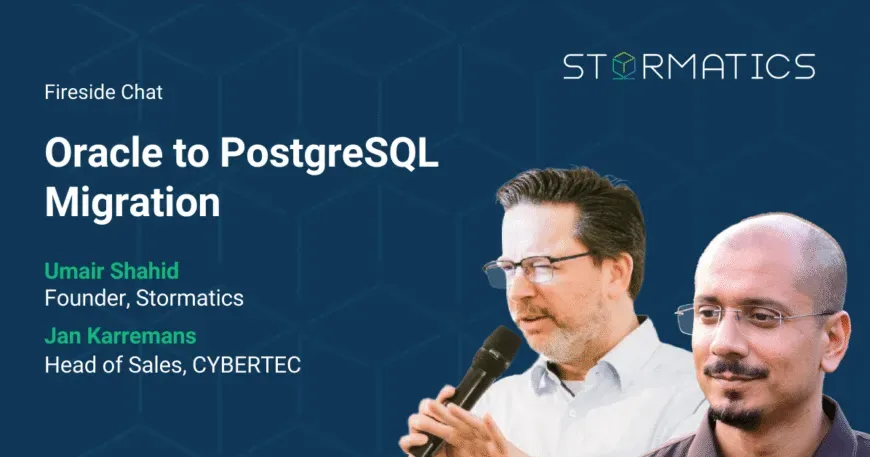We recently had a fireside session on Oracle to PostgreSQL Migration. Umair Shahid, Founder at Stormatics, and Jan Karremans, Head of Sales at CYBERTEC, discussed why Oracle to PostgreSQL migration is the most suitable choice for mission-critical infrastructures.
The attendees of the session posed many engaging questions, some of which could not be addressed during the session due to time constraints. However, here are the detailed answers to the remaining questions:
What are your thoughts on migrating a PL/SQL intensive core banking application from Oracle to Postgres?
Many of the points discussed in the webinar hold true here as well. Although both databases adhere to ANSI standards, there’s a significant aspect to consider when dealing with extensive PL/SQL code—the distinct nuances and differences in SQL handling between Oracle and PostgreSQL. While tools can facilitate a portion of this code translation automatically, it’s advisable to consult with experts familiar with both Oracle and PostgreSQL for the aspects that require manual intervention. This ensures a smoother transition and optimal compatibility.
What if the Postgres community stops working on new releases? In that case, the customer has the only option to be dependent on enterprise versions like Percona/EDB.
I would counter-argue that enterprise versions are also heavily dependent on community PostgreSQL. Without the community coming up with new releases and features each year, even the enterprise versions will stagnate. Keep in mind that the enterprise version of Postgres offered by EDB is a fork of the community version, i.e. the base is still dependent on what the community provides. Regarding Percona, their approach is not to fork but to enhance the community PostgreSQL by bundling it with a selection of tools deemed most suitable for use with the database.
Is the multi-master feature available in Postgresql or Aurora Postgresql?
As of PostgreSQL 16, you can set up a PostgreSQL cluster configured for bi-directional replication between nodes with each node acting as a master/primary. Like any multi-master solution, however, the devil is in the details and it all depends on what you need to achieve out of the setup. The requirement of setting up multi-master with PostgreSQL requires a conversation to understand the use case you are targeting.
You speak about adopting Postgres over Oracle, but how can an open-source database ever be reliable enough?
I would argue that an open source solution is more reliable than its proprietary alternative. You get transparency of code so you know there are no backdoors, you get the flexibility of customization per your requirement, you have a passionate community to lean on, etc. To top it all off, you have the choice to sign an SLA-based agreement with a PostgreSQL provider of your choice with the flexibility of taking your business to a different vendor in case you are unsatisfied – and all that without the need to change anything in your application stack.
We have contributed features to PostgreSQL based on customer requirements. Ask yourself this – when was the last time Oracle added a feature based on a requirement you had?
Postgres is missing so many features, no AMM, no RAC, no ASM, no Data Guard. How could this ever be suited for critical workloads?
This boils down to one of the things we tackled in the webinar – what are the right questions to ask? Oracle has an ecosystem of tooling (which it charges separately for) to achieve certain objectives. PostgreSQL also has an ecosystem of tooling (pretty much all of it is open source) to achieve the same objectives. So instead of naming the technology, the question to ask is whether PostgreSQL can solve a particular problem.
For example, asking if PostgreSQL has RAC may not be the correct question. Instead, try asking if PostgreSQL can support multiple masters. And the answer would be ‘yes’. Asking if PostgreSQL has Data Guard may not be the right question. Instead, try asking if PostgreSQL has a disaster recovery solution. And the answer would again be ‘yes’.
Did you miss the live session? Watch the recording here.





